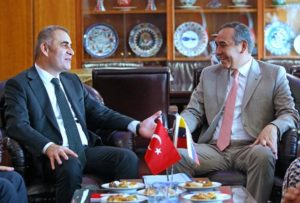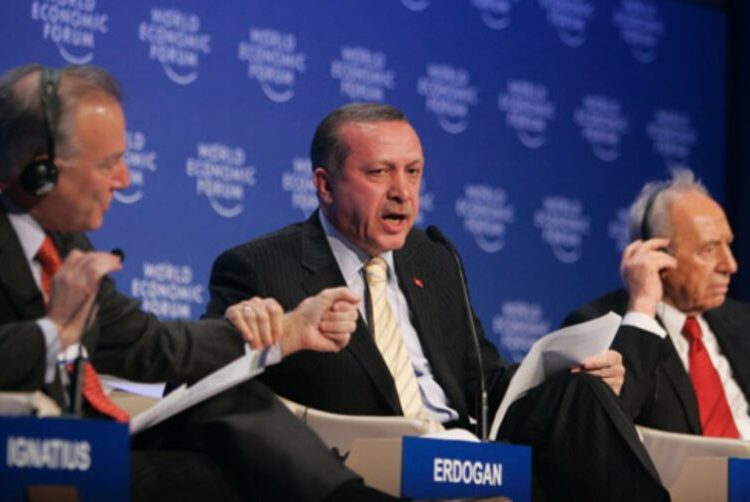Abdullah Bozkurt/Stockholm
A Turkish prosecutor cited an op-ed written by American columnist David Ignatius from The Washington Post as criminal evidence in an indictment aimed at punishing Turkish police who exposed an Iranian espionage ring in Turkey.
Irfan Fidan, the Istanbul chief public prosecutor who was hand-picked by President Recep Tayyip Erdoğan to hush up probes of Iran’s subversive and clandestine activities, ordered the police on June 9, 2015 to investigate Ignatius’s column, which revealed how Turkey blew the cover of Israel’s intelligence agency Mossad’s Iranian assets in Turkey.
In his article, published on October 16, 2013, Ignatius claimed the Erdoğan government disclosed to Iranian intelligence the identities of up to 10 Iranians who had been meeting inside Turkey with their Mossad case officers. Citing knowledgeable sources for the information, Ignatius stated that Israel sees Turkish intelligence chief Hakan Fidan as friendly with Iran. “[S]everal years ago, Israeli intelligence officers are said to have described him facetiously to CIA officials as ‘the MOIS station chief in Ankara,’ a reference to Iran’s Ministry of Intelligence and Security,” Ignatius wrote.
Turkish prosecutor Irfan Fidan orders the translation of David Ignatius’s article:
Sources described the Turkish action as a “significant” loss of intelligence and “an effort to slap the Israelis,” according to the columnist.
At the time Ignatius wrote the article, Turkish police, under orders from the investigating prosecutor, were pursuing a confidential investigation into the secret activities of Iranian intelligence officers, some of whom were working undercover as diplomats, and their connections to Turkish assets. The investigation, launched in 2010, led to key officials in the Turkish government including chief advisors of Erdoğan and incriminated Fidan as aiding and abetting Iran’s Islamic Revolutionary Guards (IRGC) Quds Force operatives.
The original and translated versions of Ignatius’s article incorporated into the indictment:
The investigation was hastily shut down in February 2014 when the Erdoğan government was made aware of a confidential judicial probe that implicated Erdoğan’s inner circle. The prosecutors, judges and police chiefs who were looking into Quds Force operations were all removed from their positions. They were later jailed and faced fabricated charges.
Turkish prosecutor’s order for payment to the translator:
Prosecutor Fidan, an Islamist with favorable views of Iran, claimed in his indictment that there was no such terrorist organization called the Quds Force, although multiple court verdicts since 2002 described it as terrorist organization under Turkish criminal law. The Supreme Court of Appeals repeatedly upheld judgements describing the Quds Force as a terrorist entity.

According to Fidan, the Turkish police conspired against the Erdoğan government in cooperation with foreign powers. Ignatius’s article was evidence cited by Fidan as a smoking gun that allegedly proved the conspiracy extended to a foreign power.
The article was translated into Turkish by court-certified translator Serpil Kütüklü, who was considered an English language expert by Fidan. She was paid 1,603 Turkish lira for her work on October 12, 2015. The translated version as well as the original were incorporated into case file No.2014/41637.
Turkish prosecutor described Ignatius’s column as part of a conspiracy:
Prosecutor Fidan described the publication of Ignatius’s article by The Washington Post as “an attempt to create public opinion against the [Turkey’s] National Intelligence Agency through propaganda.” Without providing any evidence, he also alleged that the columnist’s writing was somehow linked to US-based Turkish imam Fethullah Gülen, an anti-Iran cleric who has been a vocal critic of the Erdoğan government.

Calling Ignatius a partisan, prosecutor Fidan also recalled how then-Prime Minister Erdoğan reacted to Ignatius in 2009 and stormed off the stage at the World Economic Forum in Davos during a session on Gaza, in which Erdoğan, Israeli President Shimon Peres, UN Secretary-General Ban Ki-moon and Arab League Secretary Amr Moussa were panelists. Erdoğan left the stage after Ignatius, who was the moderator, tried to cut him off. When Ignatius tried to cut short Erdoğan’s remarks, saying it was past time to adjourn for dinner, the Turkish prime minister got furious and said: “One minute… one minute… one minute… Don’t interrupt me. You are not allowing me to speak.” He said he didn’t think he would return to Davos and stormed off the stage.
Invoice from the translation office:












